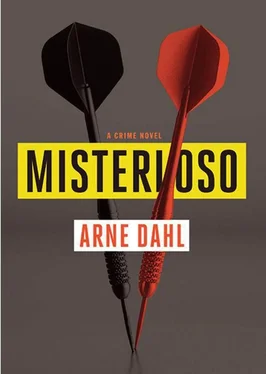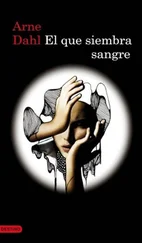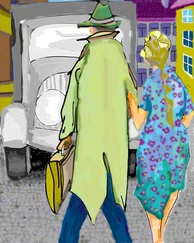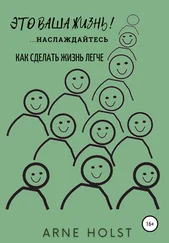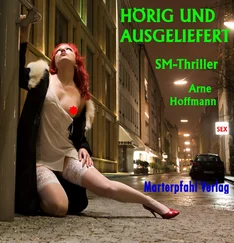“Thanks,” Hjelm said, ending the conversation.
“Do you mean that… Alf Ruben is going to be…” Wilma Hammar looked scared.
“The next victim. Yes,” Hjelm finished her sentence for her. “Don’t try to protect him out of some misplaced sense of loyalty. It might cost him his life. We know he has a mistress. Do you know who she is?”
Wilma Hammar pressed her hand to her forehead.
“I’m afraid that every second counts right now,” said Hjelm to prevent her from putting up any smoke screens.
“All right,” she said. “But I don’t know who she is. I’ve answered the phone a couple of times when she called. She has a Finnish accent. That’s all I know. But Lisa would certainly know.”
“His secretary?”
She nodded. “Lisa Hägerblad.”
“And she lives in… where was it? Råsunda? Do you have her address and phone number?”
Wilma Hammar looked them up in her phone book, then wrote them down on a little yellow Post-it Note that Hjelm stuck on his cell.
“Thanks,” he said and left. On his way down the stairs he punched in the number on the note. It rang ten times before he gave up.
Then Hultin called. “I’m sitting here with the senior employee at UrboInvest, Vilgot Öfverman. After a little persuasion he’s managed to come up with a first name and a description of the mistress. That’s all he knows, I can guarantee it. She’s short, has ash-blond hair cut in a pageboy style, and her name is Anja.”
“I can add that she’s most likely Finnish or a Finland-Swede,” said Hjelm. He heard a beep.
“I’ve got another call,” said Hultin. “Is there anything urgent?”
“The secretary in Råsunda. So far no answer.”
Hultin disappeared for a moment. Hjelm sat in his car, waiting in torment. Söderstedt came driving up in his Volvo and parked in front of him. Their cells rang. Both answered.
“Okay,” said Hultin. “This is a conference call. I’ve got Kerstin on the line, as we used to say in the old days.”
“Hello,” said Kerstin from Algotsmåla. “I’ve just had an intense conversation with Lena Lundberg. It’s true that she’s been in touch with Andersson every now and then over the past three months. She really fooled me. Andersson has told her only that he’s involved in something really important. As we suspected, she hasn’t dared tell him about her pregnancy.”
“Get to the point,” Hultin said sternly.
“I’m going to have to be a bit long-winded to explain. Lena’s brother lives in Stockholm, and the last time he was here to visit, which was only a week before the bank incident, he mentioned for some reason that one of his colleagues has a sister who’s working in the United States but can afford to allow her Swedish apartment to sit vacant. That was what Lena remembered, but she couldn’t recall the name of the woman working in the States, even though her brother did mention the name when he was visiting. But the apartment is apparently somewhere in Fittja, and when she called her brother, she got the name: Anna Williamsson. The rest is up to you.”
“Good job,” said Hultin.
“How is Lena?” asked Hjelm.
“She’s just beginning to realize the connection. She’s not doing very well.”
“See you later,” he said.
“Don’t go and get yourself shot,” she said, and was gone.
“Are the two of you ready?” asked Hultin. “Hang up, and I’ll find out the address.”
They waited, enveloped in the metal casing of their cars.
Hjelm’s phone rang. But not Söderstedt’s, as he noticed through the car window, so it probably wasn’t Hultin.
“Finally,” Chavez said into his ear. “My phone was stolen, believe it or not. I’ve just gotten it back from a junkie. What’s going on?”
“We’re hot on his trail,” said Hjelm. “Where are you?”
“Sergels Torg. I’ve had a hell of a day. I didn’t think Stockholm’s underworld was so… big.”
“Hang up and I’ll call you back in a few seconds. Hultin is checking an address. Göran Andersson’s.”
“No shit,” Chavez said, and hung up.
Hjelm’s cell rang again. Söderstedt picked up his phone at the same time.
“Hello,” said Hultin. “Anna Williamsson’s apartment is at Fittjavägen eleven, fifth floor.”
Hjelm laughed loudly.
“What?” said Hultin, sounding annoyed.
“The hand of coincidence,” said Hjelm, starting up his car. “It’s right next door to my old police station.”
They drove tandem over to Sergels Torg, where they picked up Chavez. He jumped into Hjelm’s Mazda and was given a quick rundown.
“How did Andersson sound?” Jorge asked as they came out onto Essingeleden.
“Unpleasantly sane,” said Hjelm. “As if he couldn’t possibly be the killer.”
Hjelm was trying to make sense of the chronology of events. If the lead turned out to a good one, then Göran Andersson had been living next door to the police station in Fittja while he was planning his crimes. He had gone in and out of the neighboring door, and it was even possible that they’d bumped into each other several times in February and March. Hjelm wondered if he could have seen into the apartment from his old office. Then Andersson had gone off to Danderyd to commit the first murder on the night before Hjelm, in turn, had gone into the immigration office to free the hostages. And while Hjelm was being grilled by Grundström and Mårtensson, Andersson had committed his second murder, on Strandvägen.
What was it he’d said? “There have been so many coincidences that it’s no longer a matter of chance. It’s fate. There’s a very fine line separating chance and fate, but once you’ve crossed that line, it’s irrevocable.”
Paul Hjelm thought he was close to crossing that line.
Even though they parked in the lot belonging to the Huddinge police force, it didn’t occur to any of them to request backup from the station. They entered the building next door, went up four flights of stairs, and assembled outside the door labeled Williamsson. It was utterly quiet in the building.
Hultin rang the bell. No one opened the door. Not a sound came from inside. Hultin rang again. They waited a couple of minutes. Then Hjelm kicked in the door.
They rushed in with their weapons raised. The little two-room apartment was empty. In the bedroom they found a neatly made bed with a bunch of stuffed animals on the pillow. Posters typical of a girl’s room hung on the walls. Chavez bent down and peered under the bed. He pulled out a rolled-up mattress, like a jelly roll, with a blanket as the filling. Under the bed he also found a suitcase made in Russia. It was stuffed with bundles of five-hundred-krona bills.
The living room looked just as unoccupied as the bedroom. The only thing out of place was that one of the shimmering pink posters was bulging out from the wall. It was hard to imagine that someone had been living here for over three months without disturbing anything. A clean saucepan stood on the stove. The inside was damp. A box was attached underneath the kitchen table. Hultin pulled it out.
The first thing that came into view was an assortment of keys, although all of them were blank, without notches or grooves, ready for grinding. Inside the box was another box, printed with Russian letters. Hultin put on a pair of latex gloves and opened it. There were the nine-millimeter cartridges from Kazakhstan, lined up in rows; not even half of them were missing.
Under the box of ammunition was a typed list of seventeen names. Hultin carefully picked it up and snorted an affirmative snort. Kuno Daggfeldt, check, Bernhard Strand-Julén, check, Nils-Emil Carlberger, check, Enar Brandberg, check, Ulf Axelsson, check.
The last check mark was next to the name of Alf Ruben Winge.
Читать дальше
